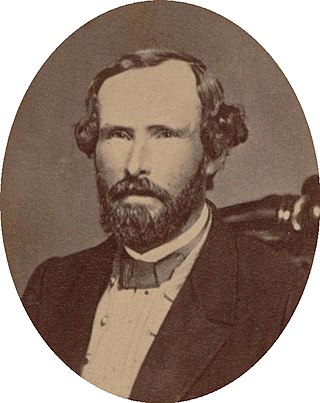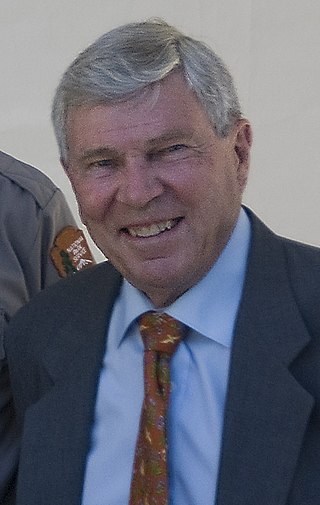Related Research Articles

Abner Doubleday was a career United States Army officer and Union major general in the American Civil War. He fired the first shot in defense of Fort Sumter, the opening battle of the war, and had a pivotal role in the early fighting at the Battle of Gettysburg. Gettysburg was his finest hour, but his relief by Maj. Gen. George G. Meade caused lasting enmity between the two men. In San Francisco, after the war, he obtained a patent on the cable car railway that still runs there. In his final years in New Jersey, he was a prominent member and later president of the Theosophical Society.

The Emancipation Proclamation, officially Proclamation 95, was a presidential proclamation and executive order issued by United States President Abraham Lincoln on January 1, 1863, during the American Civil War. The Proclamation had the effect of changing the legal status of more than 3.5 million enslaved African Americans in the secessionist Confederate states from enslaved to free. As soon as slaves escaped the control of their enslavers, either by fleeing to Union lines or through the advance of federal troops, they were permanently free. In addition, the Proclamation allowed for former slaves to "be received into the armed service of the United States". The Emancipation Proclamation played a significant part in the end of slavery in the United States.

Presidential elections were held in the United States on November 6, 1860. The Republican Party ticket of Abraham Lincoln and Hannibal Hamlin won a national popular plurality, a popular majority in the North where states had already abolished slavery, and a national electoral majority comprising only Northern electoral votes. Lincoln's election thus served as the main catalyst of the states that would become the Confederacy seceding from the Union. This marked the first time that a Republican was elected president. It was also the first presidential election in which both major party candidates were registered in the same home state; the others have been in 1904, 1920, 1940, 1944, and 2016. Lincoln's 39.7% of the popular vote is to date the lowest for any winner not decided by a contingent election.

The Civil War is a 1990 American television documentary miniseries created by Ken Burns about the American Civil War. It was the first broadcast to air on PBS for five consecutive nights, from September 23 to 27, 1990.

George Wythe Randolph was a Virginia lawyer, planter, politician and Confederate general. After representing the City of Richmond during the Virginia Secession Convention in 1861, during eight months in 1862 he was the Confederate States Secretary of War during the American Civil War, then served in the Virginia Senate representing the City of Richmond until the war's end.

James Munro McPherson is an American historian specializing in the American Civil War. He is the George Henry Davis '86 Professor Emeritus of United States History at Princeton University. He received the 1989 Pulitzer Prize for Battle Cry of Freedom: The Civil War Era. McPherson was the president of the American Historical Association in 2003.

The Battle of Fort Pillow, also known as the Fort Pillow Massacre, was fought on April 12, 1864, at Fort Pillow on the Mississippi River in Henning, Tennessee, during the American Civil War. The battle ended with Confederate soldiers commanded by Major General Nathan Bedford Forrest massacring Union soldiers attempting to surrender. Military historian David J. Eicher concluded: "Fort Pillow marked one of the bleakest, saddest events of American military history."

The Hampton Roads Conference was a peace conference held between the United States and representatives of the unrecognized breakaway Confederate States on February 3, 1865, aboard the steamboat River Queen in Hampton Roads, Virginia, to discuss terms to end the American Civil War. President Abraham Lincoln and Secretary of State William H. Seward, representing the Union, met with three commissioners from the Confederacy: Vice President Alexander H. Stephens, Senator Robert M. T. Hunter, and Assistant Secretary of War John A. Campbell.

James McClurg was an American physician and Founding Father who served as a delegate to the Philadelphia Convention which drafted the United States Constitution in 1787. McClurg served as the 18th, 21st, and 24th mayor of Richmond, Virginia. His lifelong friendship with Thomas Jefferson dated from their school days, and he later became friends with James Madison. McClurg, who was a surgeon in the Continental Army during the Revolutionary War, is believed to have owned a series of slaves over the course of his lifetime.
The bibliography of the American Civil War comprises books that deal in large part with the American Civil War. There are over 60,000 books on the war, with more appearing each month. Authors James Lincoln Collier and Christopher Collier stated in 2012, "No event in American history has been so thoroughly studied, not merely by historians, but by tens of thousands of other Americans who have made the war their hobby. Perhaps a hundred thousand books have been published about the Civil War."
The Dix–Hill Cartel was the first official system for exchanging prisoners during the American Civil War. It was signed by Union Major General John A. Dix and Confederate Major General D. H. Hill at Haxall's Landing on the James River in Virginia on July 22, 1862.
This bibliography of Abraham Lincoln is a comprehensive list of written and published works about or by Abraham Lincoln, the 16th president of the United States. In terms of primary sources containing Lincoln's letters and writings, scholars rely on The Collected Works of Abraham Lincoln, edited by Roy Basler, and others. It only includes writings by Lincoln, and omits incoming correspondence. In the six decades since Basler completed his work, some new documents written by Lincoln have been discovered. Previously, a project was underway at the Papers of Abraham Lincoln to provide "a freely accessible comprehensive electronic edition of documents written by and to Abraham Lincoln". The Papers of Abraham Lincoln completed Series I of their project The Law Practice of Abraham Lincoln in 2000. They electronically launched The Law Practice of Abraham Lincoln, Second Edition in 2009, and published a selective print edition of this series. Attempts are still being made to transcribe documents for Series II and Series III.

Events from the year 1861 in the United States. This year marked the beginning of the American Civil War.

Events from the year 1863 in the United States.
The Philadelphia Pythians was one of the earliest Negro league baseball clubs, founded in 1865. African-American leaders Jacob C. White Jr. and Octavius V. Catto established the team. The Pythians were composed of primarily business and middle class professionals from the surrounding areas of Washington, D.C., Philadelphia, and New York City. Just two years after the Civil War ended, in 1867, the Pennsylvania State Convention of Baseball, located in Harrisburg, denied the "Pythian Base Ball Club" out of Philadelphia. The team dissolved after Catto's death in 1871 and a new team formed under the Pythian name in the National Colored Base Ball League in 1887. The new team's first season went 4–1. Due to financial troubles it folded after only one season.
The following is a list of the published works of James M. McPherson, an American Civil War historian.
Corinthian Hall was a meeting hall in Rochester, New York, that was the site of significant speeches and other events. It was built in 1849 and was destroyed by a fire in 1898.
Lydia "Liddy" Broadnax was an American free Black woman, former enslaved person, and businesswoman who lived in Williamsburg and later Richmond, Virginia. Some historians have suggested that Broadnax was a concubine of her former enslaver and later employer, Founding Father of the United States George Wythe. She was denied the right to testify in the trial regarding his murder because of her race.
References
- 1 2 "Bruce Chadwick: Professor. Historian. Crime Writer?". The Jersey City Independent. Archived from the original on 2014-09-05. Retrieved 2014-09-04.
- ↑ "Bruce Chadwick". IMDb.